The Goods and Services Tax (GST) is a consumption tax that’s charged on some goods and services in New Zealand. It’s called a consumption tax because it’s levied on things we “consume” (figuratively as well as literally), rather than being levied on our income.
If you’ve ever really studied a receipt, say from a cafe, you might have noticed an extra dollar amount on your receipt marked “GST”.
GST is 15% flat tax levied on top of whatever you paid for your americano/cappuccino/oat milk latte. But it’s not profit kept by the cafe – instead, it’s collected by them on behalf of the government.
If you’re a sole trader, you may have wondered if you’re supposed to be charging GST too. And if so, how do you do it? Why do you do it? Do you have to raise your prices to cover it? What if your clients are based overseas?
All great questions. Luckily, we’ve got the answers. Let’s dig in.
1. Introduction to GST
What is GST?
Like we mentioned earlier, GST is a consumption tax levied on things we consume. We’re not just talking about food and drink here though; a consumption tax applies to most resources (goods and services) that can be used up, or “consumed”.
GST is also a flat tax, unlike income tax. This means that the GST tax rate – 15% – doesn’t change, no matter how much you earn, what you buy, or how much it costs. (Unless the product you’re selling is zero-rated – more on this later).
If you make over $60,000 in self-employed income, you’re required to register for and charge GST (see below). This means that you charge an additional 15% on top of your regular fees, which you record and pay to the government when you file your next GST return.
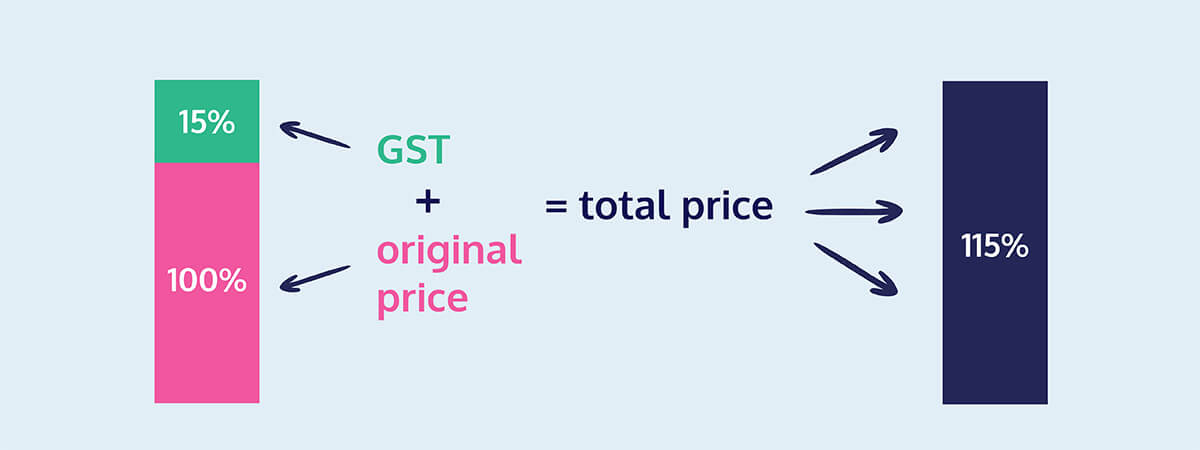
Whenever you buy goods and services for your business that have GST added, you can subtract the cost of the GST you’ve paid from the GST you need to pay the government. If you’ve paid more GST than you’ve collected, you may be eligible for a GST refund.
Not all products are subject to 15% GST. The New Zealand government exempts certain goods and services from GST, including long-term rental housing, donated goods, financial services, and (weirdly) fine metal.
Other goods and services are “zero-rated”, meaning they have a GST rate of 0% (see below). For more information, and for a full list of these goods and services, you can visit the IRD website.
Do I have to register for/charge GST?
Short answer
- If you’re registered for GST, you must charge and collect GST.
- Sole traders and businesses who make over $60,000 in self-employed income in a 12-month period have to register for GST.
Long answer
It’s more complicated than that, especially when you’re under the $60k threshold. Let’s assess your options for both situations: when you’re under $60k annual self-employed earnings, and when you’re over $60k.
If you make less than $60k in self-employed income
If you’ve made less than $60k in the last 12 months, you don’t have to register for GST. You can if you want to, but like with any business decision, there are pros and cons.
The main benefit of being GST registered is that you can claim all the GST back on your business expenses. And if you pay more in GST when buying supplies for your business than you charge your clients, you are eligible for a GST refund.
If you’re below the threshold you may decide that registering for GST isn’t worth it, as it can be a lot of extra paperwork for little reward. Ain’t nobody got time for that.
There are a few cases, however, in which you may consider registering for GST while you’re still under the threshold. If you buy a lot of supplies for your business in bulk, then being able to claim the GST back can help you better manage your cash flow. Similarly, it might make it easier to deal with your suppliers.
Whether or not you register for GST is up to you, but think of it as a calculated business decision. If you’re under the threshold, you need to decide if the benefits outweigh the cons.
Registering for GST: pros and cons
| Pros | Cons |
|---|---|
|
|
After five years of hustle, Graham has gained a bit of a reputation on the weekend market circuit. His chutneys regularly sell out, and he’s created a steady side income that amounts to $15,000 in income a year.
Harry, meanwhile, accidentally went viral on Tik Tok after someone filmed one of his sets. His standup career has exploded, he’s making $65k a year in appearances, and he’s about to go on tour.
Harry realises that as he’s now making bank, he needs to be GST registered. He tells Graham, and Graham registers for GST as well, just in case.
Harry tacks on 15% GST to his usual appearance fees. He files GST returns, and gets to claim the GST back on his microphone and equipment purchases.
Graham, however, has to add 15% on to his usual prices. He’s doesn't get to claim any GST relief as he sourcess all his fruit for free from his parents’ orchard, and his jars are all recycled.
Graham is well below the earning threshold for GST, and is not required to charge it. He doesn’t get much GST relief. It’s honestly more hassle than it’s worth.
As soon as he can, Graham cancels his GST registration.
If you make $60k+ in self-employed income
If you’re a sole trader and you earn $60k a year of self-employed income, you are required to register for and charge GST on your goods and services. Yes, even if you aren’t registered as a company, or don’t have an NZBN – neither are necessary for GST registration.
If you’re an employee with a sole-trader side hustle, you only have to register for GST once your side-hustle income reaches $60k. Your combined income doesn’t count towards the threshold.
It’s also important to note that the $60k threshold doesn’t apply to a single financial year, but rather any 12 months in succession.
For example, if you make $60k between June of one year and July the next, you’re required to start charging GST immediately – even though that 12 month period is split between two financial years.
Jim, an architect for a big firm, brews in his garage on the weekend. He sells a few bottles to his mates as more of a social thing than a form of income, and makes less than $5,000 annually. Even though his combined income is over $60k that year, his sole trader income is not. He doesn’t have to register for GST.
Naveen is a stay-at-home dad, and enjoys brewing small batch, artisanal beer as a way to earn a little extra income. He makes $15,000 that year. Although his only income is his sole trader income, because it’s less than $60k a year, he doesn’t have to register for GST.
Antonio, however, is all in. He spends a few years building his brand “Lager Then Life”, and manages to get some of his products into local Four Squares. Business picks up, and he makes $75,000 in his fourth full year of trading.
Antonio’s sole trader income is now well over $60k. He definitely needs to be GST registered, and add GST to his prices asap.
2. Registering for GST
It’s a common misconception that registering as a sole trader, or filing a self-employed tax return, or applying for an NZBN automatically registers you for GST. This isn’t the case.
If you haven’t specifically registered for GST, you are not registered for GST. You won’t have to charge GST, and you can’t apply for GST refunds.
If you HAVE registered for GST, even if you aren’t required to, you must collect and pay GST. The amount of GST you’ll need to pay is based on the income you receive during that GST period. You need to make sure that you collect GST from your clients, otherwise you’ll have to pay for it out of pocket.
Registering for GST is fairly straightforward. If you need a hand, check out our guide to registering for GST, which walks you through the process.
🙋 If you’re a Hnry user, we’ll let you know when you start approaching the $60k GST threshold. Plus, we’ll calculate and file all your GST returns for you. See how it works!
Tl;dr
💡 Unless you’ve registered yourself for GST, you are not GST registered
💡 If you are GST registered, you must charge GST
💡 If you make over $60k in any given 12-month period, you will need to register for GST
💡 You’ll need to collect GST once you’re GST registered.
GST Periods
When you register for GST, you decide how often you would like to file GST returns. This timeframe then becomes your GST period
There are three options you can choose from:
- Monthly
- Easier to keep track of, but involves more paperwork
- Bimonthly (every two months)
- 6-monthly (unless you earn over $500,000 a year)
- Harder to keep track of (if you don’t use Hnry), but less paperwork overall
You’ll also decide whether you’ll pay on a “payments” or an “invoices” schedule (FYI at Hnry, we work on a payments basis).
Sometimes, you may find that within a GST period, you’ve paid more in GST than you have collected. In these instances, you would receive a GST refund from IRD.
“Payments” vs. “Invoice” schedule
When you register for GST, you’ll also need to decide whether to register on a ‘payments’ or ‘invoice’ basis. Basically, will you pay GST when you’ve invoiced GST? Or will you pay GST after you’ve received the payment of GST?
It’s an important choice, and will affect your business’ cash flow. Let’s break down the pros and cons.
Payments Basis
When you register for GST on a payments basis, the date that you ‘recognise’ the GST on your sales will be the date that you receive the money.
For example, if you send someone an invoice on the 20th of February, and they pay you (including GST) on the 20th of March, you wouldn’t declare it to the IRD until after you’ve been paid – even if your GST period ends at the end of February.
Instead, you’d count it as part of the next GST period, at which point you’d send it to the IRD.
Invoice Basis
When you register for GST on an invoice basis, the date that you ‘recognise’ the GST on your sales will be the date that you send the invoice to your client.
Using the same example, you send an invoice on the 20th of February, and they pay it on the 20th of March. On an invoice schedule, you’d have to declare the GST as soon as you send the invoice, and send the GST to the IRD – even if you haven’t received it from your client yet.
There are some benefits to an invoice schedule for registered companies, but for sole traders, it can get stressful. Especially if your clients are notoriously late in paying their invoices.
There may also be more paperwork involved. Heads up.
Cancelling your GST registration
If your earnings drop below $60k in a 12 month period, or if you registered for GST while under the earnings threshold, and you decide that you no longer want to be GST registered, you can always cancel your GST registration.
The process is fairly straightforward. All you have to do is:
- Login to myIR
- Navigate to your GST account
- Select “More…”
- Select “Cancel account registration”
Simple! Done! Whoohoo!
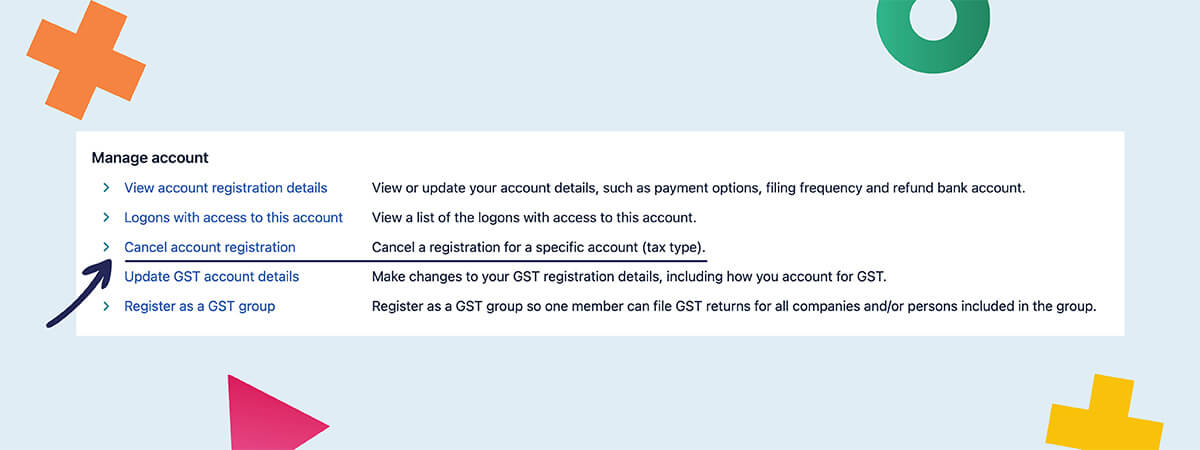
3. Charging and Collecting GST
If you’ve decided to register for GST, the next step is to actually collect GST from your customers. This means adding an additional 15% to your prices.
It can be a bit nerve-wracking to suddenly “raise your prices” by 15%. But customers are used to paying GST, and should understand that they’re not paying you extra – they’re paying tax to the government.
Clients who are GST registered should be indifferent to you charging them GST, as they can claim it back in their own GST return. But if you’re worried about the price jump, you could preempt the change with a quick email to your regular clients.
You can also specify in your quotes whether or not your prices are GST inclusive or exclusive. The way you position it could make a real difference, depending on your customer base.
What we don’t recommend doing is absorbing the cost yourself – eg. not adding 15% GST to your prices, and paying your GST bill out of your own pocket. While the cost for your customers won’t change, you’ll effectively be taking a pay cut. And that will stack up over time in terms of revenue lost – especially if it means you have less left over to invest in your business.
Remember; GST is a tax levied on your customers, not you!
Calculating GST
GST is a flat tax of 15% added to most goods and services sold by someone who is registered for GST. To add GST, you divide the original price by 100, multiply that number by 15, and then add that number on to the original price:
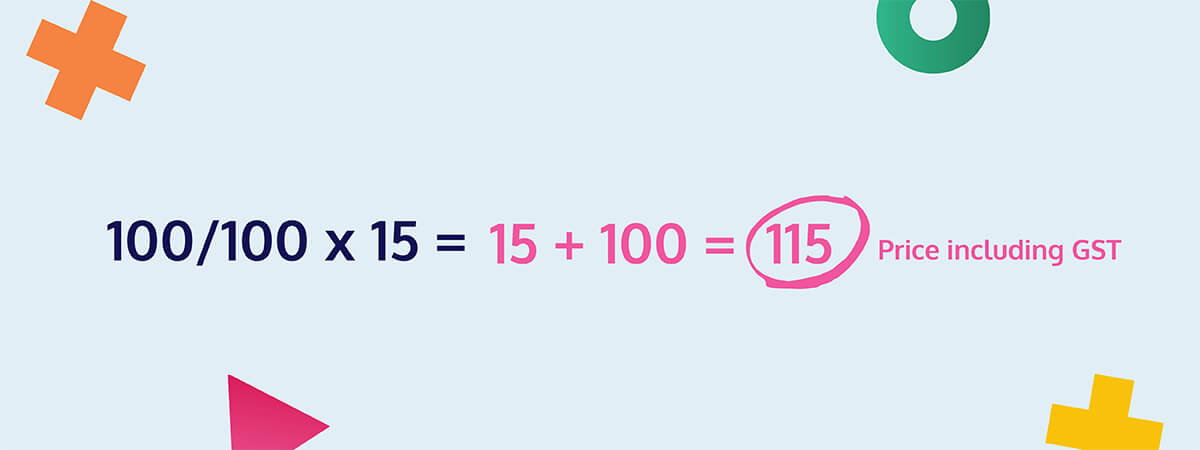
The equation to subtract GST is slightly more complicated. What you do is take the original price, multiply that by 3, divide the result by 23, round to the nearest two decimal points, and then subtract that from the price:
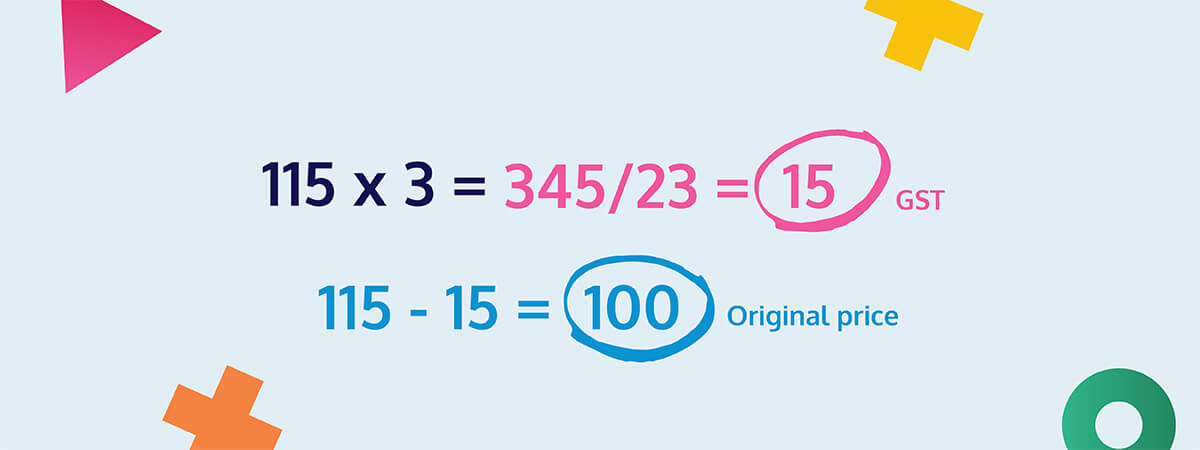
It’s not intuitive, but it works.
GST inclusive vs. added GST
Whether a price is GST inclusive, or will then have GST added on, makes a real difference to the final cost.
Say you go to a medieval fair and buy a beeswax candle for $6, a longbow for $200, and a life-sized, non-functional guillotine replica for $1500. You know, to decorate your living room.
If the price of each item was already GST inclusive, it means that 15% of the original price has already been calculated and added to the final cost:
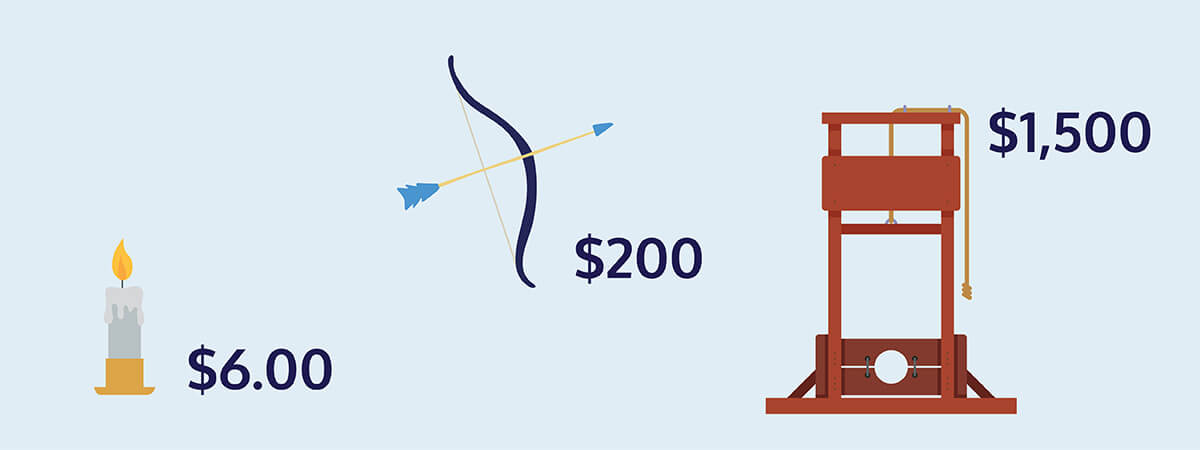
However, if each item still needed GST to be added on, the price would increase by 15%. What this means is that 15% of the original cost would be added to the final cost:
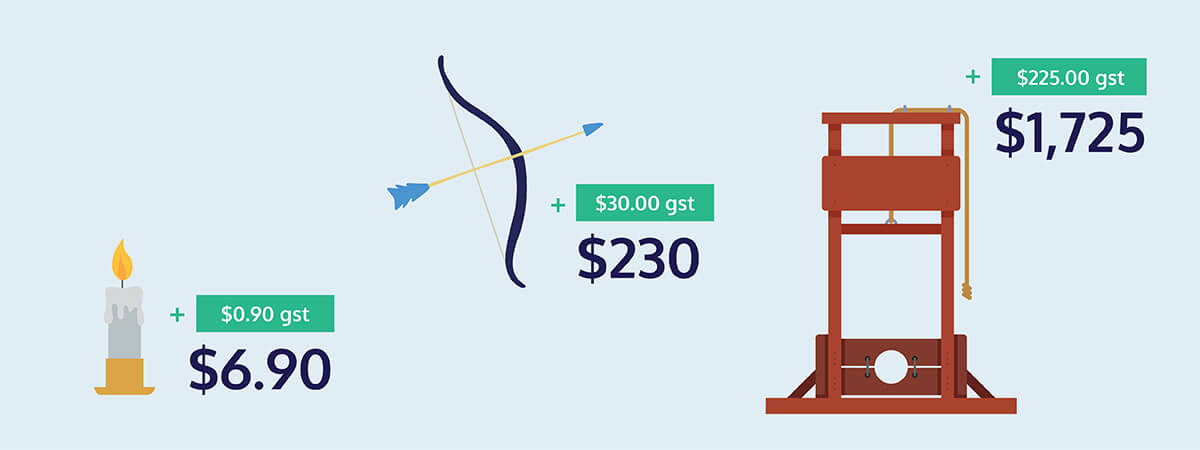
Moral of the story: Most vendors will let you know beforehand if they charge GST, but if you’re not sure, it’s worth it to check. You should also specify if your rates as a sole trader are GST inclusive or exclusive, just so there are no nasty surprises further down the track.
Also, you may want to ok a life-sized guillotine with your family before you bring it home and put it next to the TV. Just a thought.
GST Calculator
Recording GST on Invoices
As of the 1st of April 2023, the IRD has introduced new, simplified rules for GST tax invoices. If your invoice is for less than $200, it must include:
- Your name
- The date of the invoice
- A description of your goods/services
- The price of your goods/services
If your invoice is between $200 and $1,000, it must include:
- Everything mentioned above, as well as
- Your GST number
- An indication the price recorded includes GST
If your invoice is for more than $1,000, it must include:
- Everything mentioned above, as well as
- The recipient’s name
- The recipient’s address, phone number, email, trading name, NZBN, OR website
You may have also noticed that none of these invoices have to include the words “tax invoice”. That’s because they’re no longer considered tax invoices, but rather “taxable supply information”. Phew!
For those sole traders who invoice for smaller amounts, you could make your invoices even simpler by creating a separate document for clients containing the bits that don’t change – like your name, your registration number, your NZBN etc. That way, all that ever needs to be included in an invoice is the date, and a description of your products/services.
For sole traders invoicing at over $1k, you can’t simplify it – you’re basically still operating according to the old rules and requirements. Sorry team.
The good news is that these simplified invoicing rules also apply to claiming GST, as well as invoicing. So you know those frustrating clients who don’t always give you detailed invoices? If they’re invoicing you for under $200, you may now be able to claim GST without having to chase them up for more info.
Invoicing requirements table
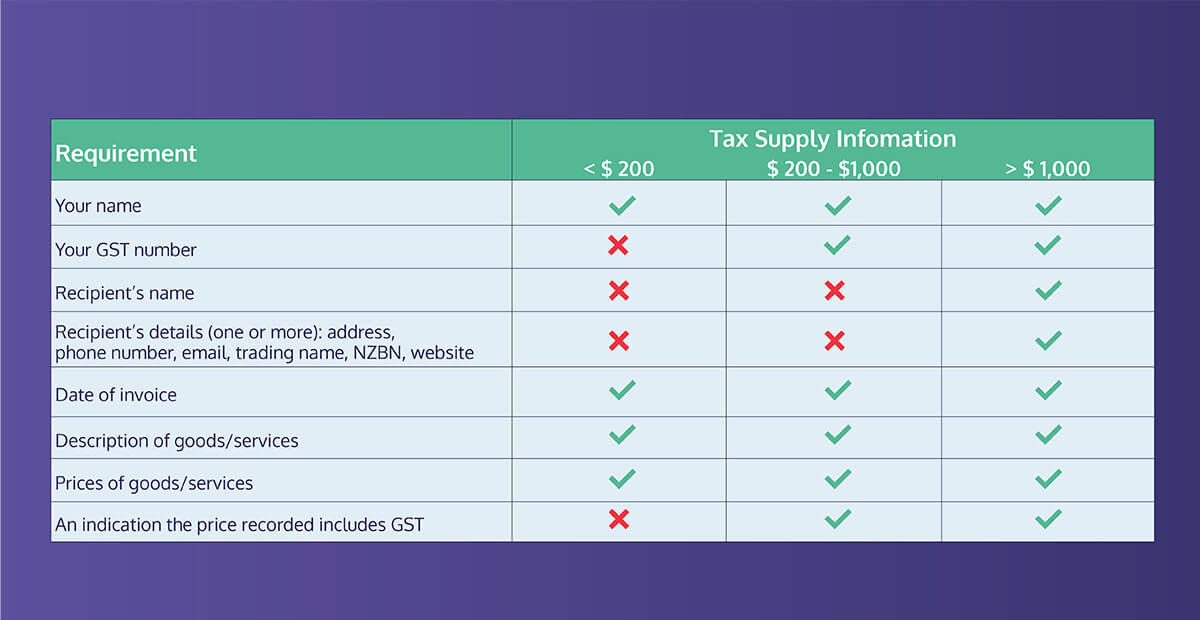
FYI, Hnry users don’t need to worry about this rule change. Invoices sent through our app will still include all the information required under the old rules, so you’re covered no matter what.
We’ll also claim back GST for our users when we file their GST returns, so they can get on with the fun stuff.
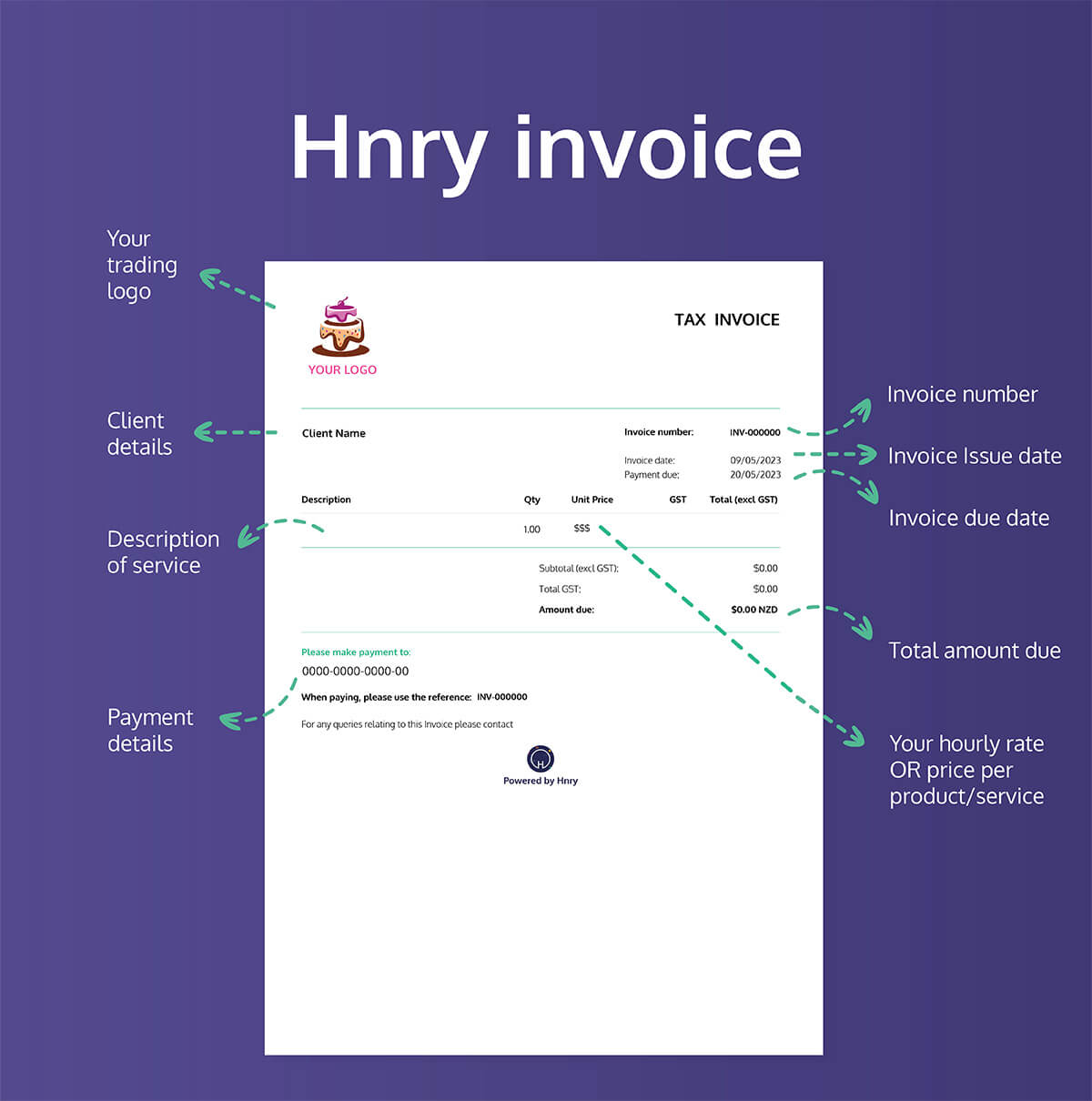
📖 Want to up your invoice game? Check out our guide to invoicing like a pro
Charging/Paying GST overseas
Charging GST overseas
Whether or not you need to charge GST when selling your stuff overseas depends on whether or not your client exists in New Zealand.
By that we mean whether or not they operate in, or have any trading presence in Aotearoa. We’re not trying to spark an existential crisis.
If your client operates outside of New Zealand, with no local presence, you generally charge them GST at a rate of 0% (this is referred to as being “zero-rated”).
While this seems illogical, there’s a difference between zero-rated and exempt.
- If you sell products that will be zero-rated, you’re still allowed to claim GST back from the IRD for any GST purchases you make.
- If you only sell products that are GST exempt, you’re actually not eligible to claim GST on business expenses. You shouldn’t be registered for GST.
So if you sell zero-rated products or services to an overseas client, you still need to record GST of $0.00 in your invoice. You’d include these sales in your regular GST returns. And you’re still eligible to claim back any GST you’ve paid for business expenses.
One of her clients is a videogame retail company called “Cyclone Games”, who solely operate in Australia. She writes reviews of the latest video game releases, which they then publish on their website.
Because Maria lives and works in New Zealand, and Cyclone Games has no New Zealand presence, the service she provides them is zero-rated for GST purposes. She charges them GST at 0%, and is still able to claim the GST back for her business expenses.
In a year or two, Cyclone Games plan to expand their business to New Zealand, making their games available for online purchase for Kiwis. When they do this, Maria will no longer be able to zero-rate the services she provides to them, and will have to charge them GST at 15%.
💡Even if the product you’re supplying your client is zero-rated for GST, you still have to charge them GST – just at a rate of 0%. This means they pay nothing in GST, but you still have to record these sales in your regular GST returns. Yep, we know it’s weird and confusing – it’s just one of those things.
Paying GST overseas
Whether or not you pay GST on overseas purchases depends on who you’re buying from.
If an overseas business makes more than $60k NZD from low-value goods on New Zealand sales, they’ll be required to register for GST (are you sensing a theme here?).
They’ll then charge kiwi consumers 15% GST on top of their prices, to be passed on to the New Zealand government.
If an offshore supplier makes less than $60k NZD from New Zealand purchases, they’re not required to charge GST.
If you’re a GST-registered sole trader buying supplies for your business, your offshore supplier isn’t required to charge GST, even if they’re GST registered in their own country.
However, if you purchase something worth more than $1,000 NZD, New Zealand Customs Service will charge you GST, not your supplier.
Sounds confusing? Yeah, it is a bit. Basically, if you’re GST registered and you’re charged NZ GST, you can claim it in your GST return. If you’re not charged NZ GST, you don’t need to worry about it.
4. GST Returns
What is a GST return?
When you’re GST-registered, you are required to file GST returns on a regular basis.
A GST return is essentially a declaration to the IRD of:
- the total GST you’ve collected on your sales/income; and
- the total GST you’ve paid while making business purchases.
What you then pay to the IRD is the balance between the two figures:
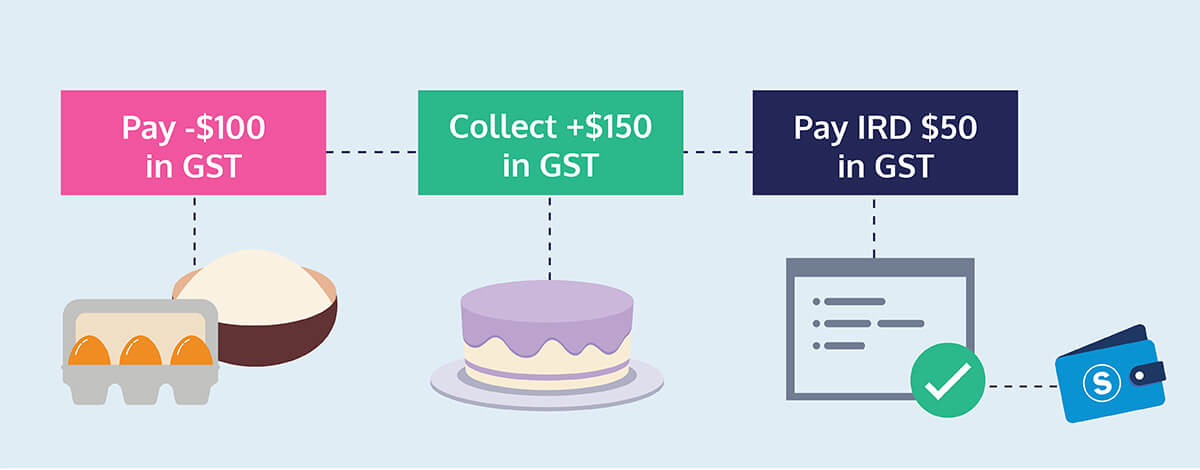
In the last two months, she’s paid $100 in GST on cake ingredients, and collected $150 in GST from cake sales.
Instead of paying the full $150 collected to the IRD, Sarah subtracts the $100 GST she’s paid from the total she’s collected. She pays the IRD $50, and keeps the rest.
💡 Hold any GST you collect separately from the rest of your income. That way, you’ll always have the right amount on hand to send to the IRD. If not, you’ll be hit with fines and penalties. If you’re a Hnry customer, we do this on your behalf!
Whenever a GST period is complete, you’ll need to fill out a GST return. It can get slightly complicated, but the IRD walks you through the process on their website.
When are GST returns due?
Generally, GST returns are due on the 28th day of the month after the GST period ends.
For example, if you file 6-monthly and your GST period is from the 1st of December to the 31st of May, your GST return will be due on the 28th of June.
It’s a good idea to make a note of your GST return due dates and note them in your calendar. If you file late, you may end up with fines and penalties.
Alternatively, you could use Hnry. For just 1% of your self-employed income (capped at $1,500 a year), Hnry will calculate, pay, and file all your taxes for you. This includes filing ALL YOUR GST RETURNS. Whoohoo!
5. Tl;dr: GST Overview
Ok, we know that that’s a lot of information. To help it all stick, here are the quick takeaways:
- GST is a flat-rate tax of 15% levied on certain goods and services.
- You don’t need to register for GST if you’re a sole trader. If your income is below $60,000 in a 12 month period, registering for GST is optional.
- If you haven’t registered for GST, you’re not registered for GST. It’s not an automatic thing.
- You can be registered for GST as an individual sole trader – you don’t need to register a company, or even have an NZBN
- You can’t charge GST unless you’re registered for GST. If you’re registered for GST, you must charge GST (or get caught out by the IRD)
- If you register for GST partway through the year, you start charging GST from then on – you don’t have to back pay.
- GST returns are filed on a monthly, bimonthly, or 6-monthly basis.
Hnry will do it all for you. No, seriously.
You can read a 4000-word article on GST – or you can let us do it all for you instead.
(If you’ve made it this far though, we’re seriously impressed. Nerd.)
For just 1% of your self-employed income, capped at $1500 a year, Hnry will calculate and pay all your taxes, levies and whatnot for you, including:
- Income tax
- GST
- ACC levies
- Student loan repayments
- KiwiSaver contributions
We also file your income tax and GST returns for you, at no added cost. AND we handle all your financial admin, like:
- claiming expenses,
- sending quotes and invoices,
- and chasing up late-paying customers (politely of course.)
Basically, you don’t have to go at it alone anymore. Hnry was designed by sole traders, for sole traders. We know exactly what you need to get the job done.
Join Hnry today!
Share on:


